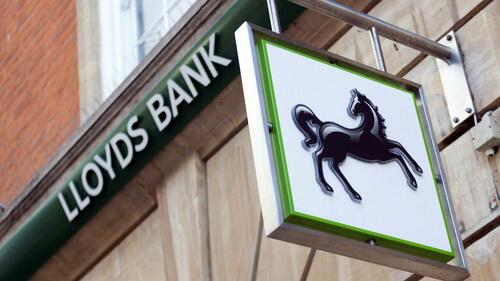
British banks have classified some $1.1 billion pounds (US$1.26bn) worth of emergency pandemic loans as fraud, according to data published Monday by the UK's Department for Business, Energy and Industry (BEIS).
Of that, Lloyds Banking Group has been hit the hardest - at roughly 300 million pounds (US$346 million) of the so-called "bounce back" loans intended for small businesses.
The bank also saw a higher ratio of likely fraud, with some 3.6% of its 8.5 billion pounds of bounce back loans marked as suspicious, according to Reuters.
Barclays, NetWest, and HSBC fared better, at 2.4%, 1.7% and 1.3% of loans classified as suspected fraud.
"Where fraud has been identified, we have acted promptly and have already recovered the majority of these funds without calling on the guarantee and we will continue to attempt to do so even after a claim has been submitted," a Lloyds spokesman told Reuters, adding that at least it's lower than the 7.5% average estimated by the scheme's administrator, the British Business Bank.
The other banks said the differing levels could partly reflect some lenders having more sophisticated fraud detection measures, as well as different thresholds for classifying a loan as suspect.
The levels of fraudulent loans at the lenders are not final and are subject to change. Under the scheme rules, the government is responsible for the fraud costs if banks can prove they administered the scheme correctly. -Reuters
"These schemes were implemented at unprecedented speed to protect millions of jobs and businesses. If the government didn't move quickly, more businesses would have failed and many more jobs lost," said a government spokesperson.
Yet, while the large banks led by Lloyds were able to beat the BBB's expectations, smaller lenders were hit disproportionately hard by suspected fraud.
New Wave Capital Limited, based in London - and which trades as Capital On Tap, as well as Conister Bank based on the Isle of Man, reported 27% and 24% respectively of their loans reported as fraud, according to a Reuters calculation.
The fraud report may present a headache for Britain's ruling Conservative party over how the emergency lending program was executed in 2020 - which led to the resignation of junior government minister, Theodore Agnew, who said efforts to stop fraud and abuse on the loans was "woeful."
Across the pond, the US Justice Department has charged people with about $1 billion in Paycheck Protection Program (PPP) fraud so far, and is investigating cases involving $6 billion more, according to the NY Times. That said, some reports have placed the amount of "improper" unemployment payments to more than $163 billion.
British banks have classified some $1.1 billion pounds (US$1.26bn) worth of emergency pandemic loans as fraud, according to data published Monday by the UK’s Department for Business, Energy and Industry (BEIS).
Of that, Lloyds Banking Group has been hit the hardest – at roughly 300 million pounds (US$346 million) of the so-called “bounce back” loans intended for small businesses.
The bank also saw a higher ratio of likely fraud, with some 3.6% of its 8.5 billion pounds of bounce back loans marked as suspicious, according to Reuters.
Barclays, NetWest, and HSBC fared better, at 2.4%, 1.7% and 1.3% of loans classified as suspected fraud.
“Where fraud has been identified, we have acted promptly and have already recovered the majority of these funds without calling on the guarantee and we will continue to attempt to do so even after a claim has been submitted,” a Lloyds spokesman told Reuters, adding that at least it’s lower than the 7.5% average estimated by the scheme’s administrator, the British Business Bank.
The other banks said the differing levels could partly reflect some lenders having more sophisticated fraud detection measures, as well as different thresholds for classifying a loan as suspect.
The levels of fraudulent loans at the lenders are not final and are subject to change. Under the scheme rules, the government is responsible for the fraud costs if banks can prove they administered the scheme correctly. -Reuters
“These schemes were implemented at unprecedented speed to protect millions of jobs and businesses. If the government didn’t move quickly, more businesses would have failed and many more jobs lost,” said a government spokesperson.
Yet, while the large banks led by Lloyds were able to beat the BBB’s expectations, smaller lenders were hit disproportionately hard by suspected fraud.
New Wave Capital Limited, based in London – and which trades as Capital On Tap, as well as Conister Bank based on the Isle of Man, reported 27% and 24% respectively of their loans reported as fraud, according to a Reuters calculation.
The fraud report may present a headache for Britain’s ruling Conservative party over how the emergency lending program was executed in 2020 – which led to the resignation of junior government minister, Theodore Agnew, who said efforts to stop fraud and abuse on the loans was “woeful.”
Across the pond, the US Justice Department has charged people with about $1 billion in Paycheck Protection Program (PPP) fraud so far, and is investigating cases involving $6 billion more, according to the NY Times. That said, some reports have placed the amount of “improper” unemployment payments to more than $163 billion.







